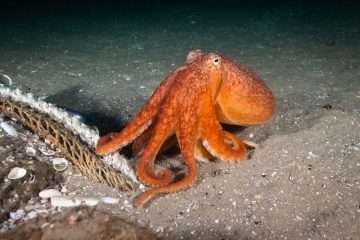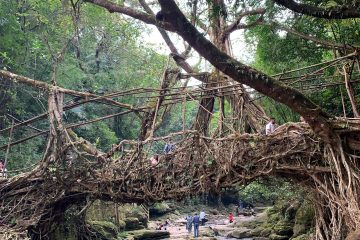The Strangeness of the Planetary Future

Wicked problems call for puzzling solutions. Wicked, here, is of course not the slang skater/surfer/stoner complement when something is amazing. Rather, it is a technical term that identifies what the nature of problems that result from the complex situations, and in this context I mean the chaotic systems of climate change and globalization. It suggests that there are no easy answers and no easy, single solutions. Furthermore, every answer and solution will turn up more unforeseen problems. A peaceful utopia is not in the planet’s future. This is not only because planetary problems have become more complex, but also because new ideas, entanglements, and politics emerge in the process of nature naturing (or the ongoing process of life) that would not have been thought of or possible before. Some of these new entanglements to us can seem quite odd, or downright impossible. But if we pay close attention and stick with the oddness, then perhaps new alliances, ideas, and creative solutions can emerge that work for the good of the future of the evolving planetary community.
Let me give you some examples of what I mean, and I’m sure you could add plenty more. This last summer (2023) was the hottest on record since records have been kept. Droughts, floods, and fires seemed to be the focus of the daily news. Human-caused climate change is the major culprit, but some unexpecting contributors are also being discovered. Unexpected culprit number 1: less air pollution. Since governments around the world have been passing cleaner air acts, the air has indeed become better to breathe. According to a recent study published in Science, this is great news for our lungs, but because there are less things like sulfur in the atmosphere, more of the sun’s energy can get through, which has a warming effect. I’m not suggesting that we promote dirtier technologies, but we will have to look for these unexpected bumps in the roads that lead us to a future of greener and cleaner technology. Our efforts to “do better” will also have unintended negative effects, and it is important to keep these possibilities on the radar screen.
Another example of these odd, unexpected entanglements comes from the state of Florida, where I am a professor. I have long been a critic of the power corporations and the disregard they often have for places and people. Ever since reading When Corporations Rule the World when I was in college, I have been an advocate for revoking the “personhood” status of corporations that give them so many rights, and so much accumulated power over time. I followed closely and was in solidarity with the Seattle riots, Occupy Wall Street movement, and many of the battles against the extraction of natural resources by multinational corporations that have little to no regard for social, historical, and environmental issues. I never in a million years thought that I would be rooting for one of the largest companies in the world, Disney. Yet, in the state of Florida, the company is fighting a fascist governor and has become somewhat of an advocacy voice for issues of Diversity, Equity and Inclusion, and in particular around LGBTQ+ issues. While I am, of course, still critical of corporate power, I am finding this newfound love of Disney to be a very strange bedfellow.
Still another example, this time from the European Union (EU) context, is the changing attitudes by left leaning Europeans regarding NATO and other such political alliances. If you, like me, have been leery of NATO because it supports the giant military industrial complex, then you are in good company with the political left in the EU. Since Russia’s invasion of the Ukraine, however, the fight against NATO has lost some steam. It’s not as easy to fight against NATO when Russia is at the doorstep, and that alliance is what has really helped defend the EU border between Poland and the Ukraine. How do we remain critical of the military industrial complex while also acknowledging that we must defend ourselves and whatever we think western democracy is, from the likes of a Vladimir Putin? And, how do we embrace the millions of Russians who don’t agree with their dictator rather than stoke the fires of ethnocentric hatred toward Russia in general?
These problems are messy, and the solutions are far from black and white. We can add to this list the strangeness of Barbie Feminism; the fact that pluralism around the world, due to the mixing of so many different cultures and peoples, has in part depended on the fossil fueled reality that has now brought us climate change; the joining together of the far left and far right in anti-vax movements; and the environmental costs of mining lithium as we move toward more green technologies. As Théoden from “Lord of the Rings” might say, “the old alliances are dead.” What new planetary alliances we make will most likely be stranger than we can imagine. Much like the “strange strangers” of Timothy Morton’s work, these new entanglements will continue to emerge in the complex worlds in which we live. But we need to stay with these paradoxes and oddities because, staying with the trouble, facing Gaia, and facing daily apocalypses with care, will be essential for re-attuning to the new worlds that begin to emerge. We must pay deep attention because knowing anything doesn’t depend upon “likeness” to what we already know, but on “difference.”
The ways in which we know what anything is, is that our language and our ideas can never actually contain a thing, event, person, place, etc. We know the cat because the cat is constantly challenging our understanding of “cat.” We know people because they continue to surprise us by not conforming to our understanding of them. We understand the world because things are different, not because they are “like” us. This difference is at the heart of the entangled, evolving world. Judith Butler’s understanding of queer theory, Jacques Derrida’s understanding of epistemology, and so many other critical theories have stressed this understanding of knowledge and the importance for taking specific embodied experiences of the world seriously.
There is no one experience of life that we all share, and thus cultivating “better” perspectives on the evolving, entangled world in which we live will demand taking account of as many experiences of nature-naturing as is possible: even the perspectives of the more-than-human world to the best of our ability to do so. If we are to attune to the ever-evolving planetary community, then we need to be ready to embrace the strange strangers in our midst.
#
Whitney A. Bauman is Professor of Religious Studies at Florida International University (FIU) in Miami, FL. He is also co-founder and co-director of Counterpoint: Navigating Knowledge, a non-profit based in Berlin, Germany that holds public discussions over social and ecological issues related to globalization and climate change. His areas of research interest fall under the theme of “religion, science, and globalization.” He is the recipient of a Fulbright Fellowship and a Humboldt Fellowship, and in 2022 won an award from FIU for Excellence in Research and Creative Activities. His publications include: Religion and Ecology: Developing a Planetary Ethic (Columbia University Press 2014), and co-authored with Kevin O’Brien, Environmental Ethics and Uncertainty: Tackling Wicked Problems (Routledge 2019); 3rd edition of Grounding Religion: A Fieldguide to the Study of Religion and Ecology, co-edited with Kevin O’Brien and Richard Bohannon, (Routledge 2023). He is also the co-editor with Karen Bray and Heather Eaton of Earthly Things: Immanence, New Materialisms, and Planetary Thinking (Fordham University Press 2023). His next monograph is entitled, A Critical Planetary Romanticism: Literary and Scientific Origins of New Materialism (Columbia University Press, Forthcoming 2024).
Counterpoint blogs may be reprinted with the following acknowledgement: “This article was published by Counterpoint Navigating Knowledge on 12 September 2023.” The views and opinions expressed on this website, in its publications, and in comments made in response to the site and publications are those of the author(s) and do not necessarily reflect the views and opinions of Counterpoint: Navigating Knowledge, its founders, its staff, or any agent or institution affiliated with it, nor those of the institution(s) with which the author is affiliated. Counterpoint exists to promote vigorous debate within and across knowledge systems and therefore publishes a wide variety of views and opinions in the interests of open conversation and dialogue.
Photo credits: Magic Kingdom Vehicle Entrance, © Guy Percival, free download from PublicDomainPictures.



